Инструменты управления рабочими процессами созданы для автоматизации процессов, улучшения командного сотрудничества и повышения общей производительности. Этот гид выделяет 10 лучших инструментов управления рабочими процессами, которые могут помочь компаниям любого размера достичь своих операционных целей, оптимизируя рабочие процессы и устраняя узкие места.
Что такое программное обеспечение для управления рабочими процессами?
Программное обеспечение для управления рабочими процессами — это специализированная платформа, которая помогает организациям оптимизировать свои внутренние процессы, автоматизируя повторяющиеся задачи и структурируя рабочие процессы для повышения эффективности. Оно объединяет такие функции, как планирование задач, управление ресурсами и инструменты для совместной работы в единую систему, позволяя командам более эффективно управлять своей работой.
Это программное обеспечение особенно ценно для компаний, которые требуют детального отслеживания задач, сроков и ресурсов в различных департаментах. Обеспечивая централизованную систему, программное обеспечение для управления рабочими процессами помогает гарантировать, что все участники команды согласованы с целями компании, тем самым повышая общую производительность и снижая риск ошибок.
Преимущества программного обеспечения для управления рабочими процессами
Программное обеспечение для управления рабочими процессами предлагает несколько ключевых преимуществ, которые могут значительно улучшить бизнес-операции:
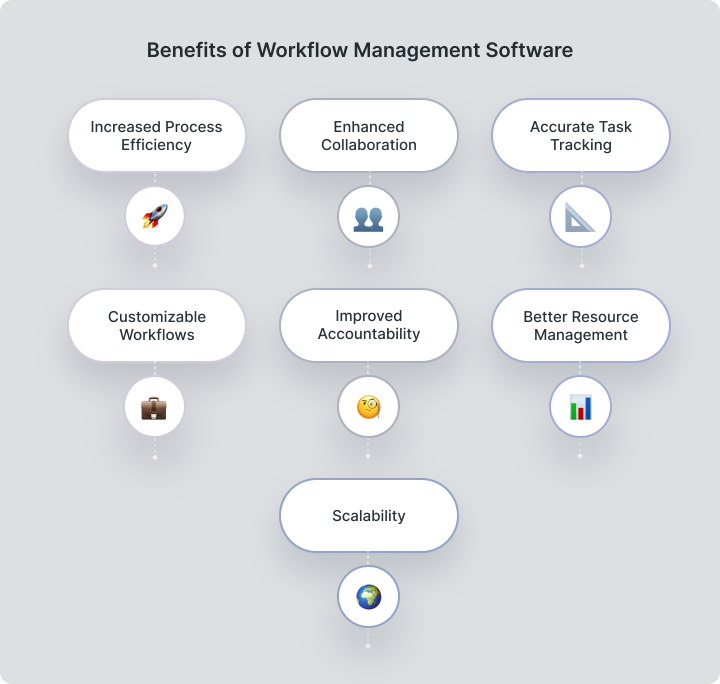
- Повышенная эффективность процессов: Автоматизация рутинных задач сокращает время, затрачиваемое на ручные процессы, позволяя командам сосредоточиться на стратегических действиях. Это приводит к более быстрому выполнению задач и улучшению операционной эффективности.
- Улучшенное сотрудничество: Централизованная платформа позволяет участникам команды сотрудничать, обмениваться документами и эффективно общаться. Обновления в реальном времени позволяют всем быть согласованными с целями проекта, способствуя командной работе и прозрачности.
- Точное отслеживание задач: Отслеживание задач в реальном времени помогает компаниям следить за прогрессом, соблюдать сроки и оперативно решать проблемы. Эта видимость поддерживает более обоснованное принятие решений и распределение ресурсов.
- Настраиваемые рабочие процессы: Возможность создавать и модифицировать рабочие процессы позволяет организациям быстро адаптироваться к изменяющимся потребностям бизнеса, обеспечивая эффективность и актуальность процессов.
- Улучшенная ответственность: Четко определенные роли и обязанности повышают ответственность, обеспечивая эффективное выполнение задач. Прозрачные функции, такие как аудиторские следы, снижают вероятность недопонимания.
- Лучшее управление ресурсами: Данные о распределении ресурсов помогают оптимизировать время, бюджет и людские ресурсы, обеспечивая выполнение проектов в срок и в рамках бюджета.
- Масштабируемость: Программное обеспечение для управления рабочими процессами масштабируется с ростом бизнеса, справляясь с растущей сложностью, не жертвуя производительностью.
Как выбрать правильное программное обеспечение для управления рабочими процессами
При выборе правильного программного обеспечения для управления рабочими процессами важно тщательно оценить несколько ключевых факторов. Масштабируемость имеет решающее значение, так как ваше программное обеспечение должно расти вместе с вашим бизнесом, эффективно обрабатывая больше пользователей, процессов и данных без ущерба для производительности.Настройка также критически важна. Программное обеспечение должно позволять вам настраивать рабочие процессы, формы и отчеты в соответствии с вашими конкретными потребностями бизнеса. Простота использования — еще один критический аспект. Программное обеспечение должно иметь интуитивно понятный и удобный интерфейс, которым могут легко пользоваться даже ненадежные участники команды, минимизируя кривую обучения и обеспечивая быструю адаптацию.
Возможности интеграции также имеют большое значение. Программное обеспечение должно seamlessly соединяться с другими инструментами, на которые полагается ваш бизнес, такими как системы CRM, бухгалтерское программное обеспечение и коммуникационные платформы. Наконец, надежная поддержка клиентов необходима для решения любых возникающих проблем и помощи в максимизации потенциала программного обеспечения. Ищите решения, которые предлагают всесторонние варианты поддержки, включая учебные материалы, вебинары и оперативное обслуживание клиентов. Учитывая эти факторы, вы можете выбрать программное обеспечение для управления рабочими процессами, которое не только соответствует вашим текущим потребностям, но и поддерживает долгосрочный рост и успех вашего бизнеса.
Методология
Чтобы определить лучшие инструменты управления рабочими процессами на 2026 год, мы провели комплексную оценку на основе следующих критериев:
- Основные функции: Мы проанализировали основные функции, предлагаемые каждым программным обеспечением, такие как управление задачами, автоматизация рабочих процессов, отчеты, облачное хранилище и инструменты для совместной работы. Мы также рассмотрели продвинутые функции, такие как картирование процессов, возможности интеграции и варианты настройки.
- Обратная связь от пользователей: Мы рассмотрели рейтинги и отзывы пользователей, чтобы понять, как программное обеспечение функционирует в реальных сценариях, что помогает нам оценить удовлетворенность пользователей и выявить любые потенциальные недостатки.
- Масштабируемость: Мы оценили способность программного обеспечения поддерживать растущий бизнес, учитывая, насколько хорошо оно может справляться с увеличением объемов работы, числом пользователей и объемом данных.
- Поддержка клиентов: Мы оценили качество и доступность клиентской поддержки, включая то, насколько быстро и эффективно решаются проблемы, и наличие обучающих ресурсов.
- Цены: Мы сравнили стоимость каждого программного обеспечения, учитывая абонентскую плату, а также любые дополнительные расходы на поддержку, обновления и интеграцию, гарантируя, что каждый инструмент предлагает хорошую ценность за деньги.
Лучшие программы для управления рабочими процессами в 2026 году
Начнем с короткой таблицы сравнения, чтобы сэкономить ваше время, если вы просто хотите быстро проверить.
Название | Ключевые функции | Лучше всего для | Цена за пользователя/месяц |
Worksection | Управление задачами, отслеживание времени, диаграмма Ганта, Канбан, отчеты, календарь, контроль доступа. | Малые и средние предприятия | от $3.4 за пользователя/месяц |
Asana | Отслеживание задач, графики, отчеты | Универсальное управление рабочими процессами в различных отраслях | от $10.99 за пользователя/месяц |
Wrike | Расширенное управление задачами, диаграммы Ганта, шаблоны | Команды, нуждающиеся в детальной автоматизации рабочих процессов | от $9.80 за пользователя/месяц |
Trello | Доски Канбан, интеграции, автоматизация | Простое управление задачами для стартапов | от бесплатно / $5 за пользователя/месяц |
Jira | Отслеживание проблем, гибкое управление проектами, отчеты | Команды разработки ПО и IT | от $7.16 за пользователя/месяц |
Monday.com | Настраиваемые рабочие процессы, отслеживание времени, интеграции | Стартапы и растущие предприятия | от $9 за пользователя/месяц |
Airtable | Настраиваемые представления, сотрудничество, интеграции | Команды, нуждающиеся в гибкости в управлении рабочими процессами | от $20 за место/месяц |
Notion | Управление задачами, базы данных, командное сотрудничество | Универсальный инструмент для управления проектами и знаниями | $10 за пользователя/месяц |
Pipefy | Автоматизация рабочих процессов, формы, управление задачами | Компании, стремящиеся автоматизировать повторяющиеся процессы | Цена по запросу |
Smartsheet | Сетевой интерфейс, отчеты, отслеживание ресурсов | Идеально для команд с большим количеством проектов и сложными рабочими процессами | от $9 за место/месяц |
Worksection
Worksection — это мощный сервис управления рабочими процессами, предназначенный для упрощения совместной работы и оптимизации отслеживания задач. Он предлагает диаграммы Ганта и доски Канбан для визуального планирования проектов, отслеживание времени для мониторинга прогресса и продвинутые инструменты сотрудничества, которые делают коммуникацию в команде легкой. Интуитивно понятный интерфейс Worksection делает его доступным для малых и средних предприятий, а его возможности настройки позволяют компаниям адаптировать рабочие процессы под свои конкретные нужды. Цена начинается от $3.4 за пользователя/месяц, что делает его универсальным и доступным решением для компаний, стремящихся улучшить управление рабочими процессами.
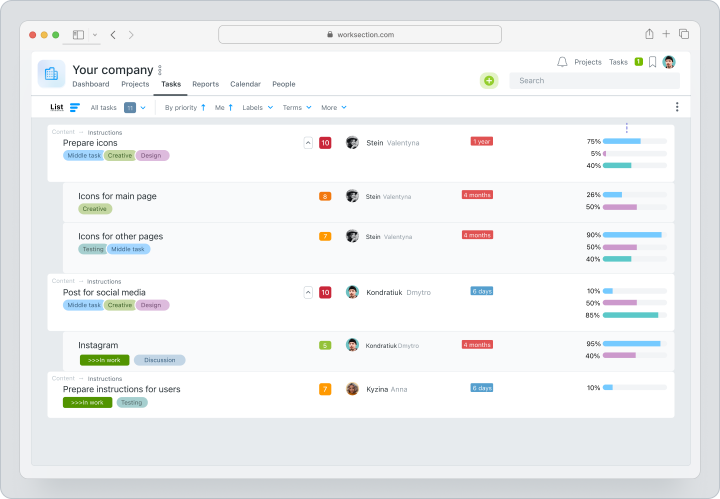
Asana
Asana — это ведущий инструмент управления рабочими процессами, известный своей способностью упрощать управление задачами и улучшать командное сотрудничество. Он предлагает множество функций, включая графики для визуализации расписаний проектов, инструменты отчетности для мониторинга прогресса и бесшовные интеграции с другими бизнес-инструментами. Универсальность Asana делает его подходящим для компаний всех размеров и различных отраслей. Цена начинается от $10.99 за пользователя в месяц, предоставляя мощное и доступное решение для эффективного управления сложными рабочими процессами.
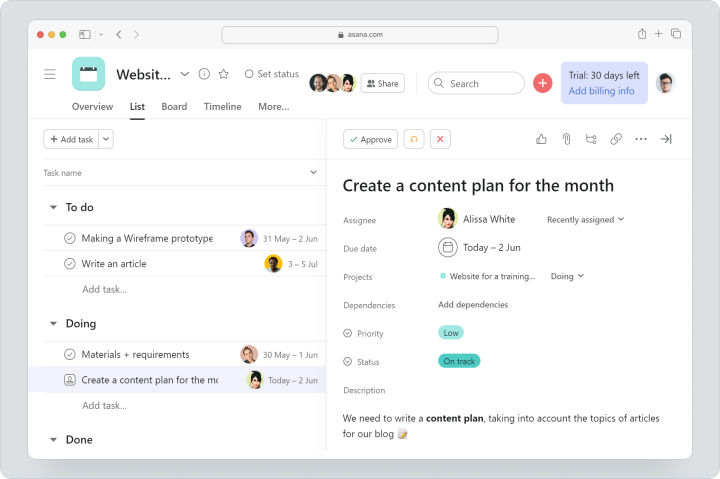
Wrike
Wrike — это мощное программное обеспечение для управления рабочими процессами, которое предлагает расширенные функции управления задачами, включая диаграммы Ганта, настраиваемые шаблоны и детальные отчеты. Оно идеально подходит для команд, которым требуется точная автоматизация рабочих процессов и необходимость управлять сложными проектами с высокой степенью точности. Возможности интеграции Wrike и гибкие варианты настройки делают его ценным инструментом для компаний, полагающихся на несколько платформ. Цена начинается от $9.80 за пользователя в месяц, что предлагает отличную ценность для компаний, стремящихся улучшить управление рабочими процессами.
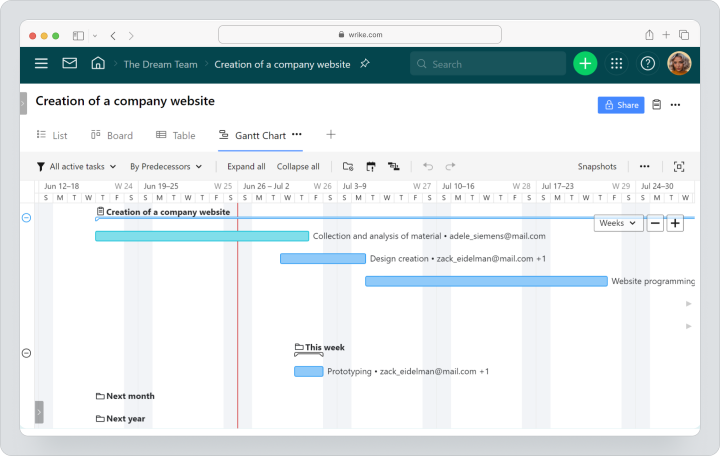
Trello
Trello — это широко используемый инструмент управления рабочими процессами, известный своей простотой и гибкостью. Он использует систему доски Канбан, чтобы помочь командам визуализировать задачи и отслеживать прогресс в удобном интерфейсе. Trello предлагает базовые функции управления рабочими процессами бесплатно, с премиум-опциями, такими как автоматизация и интеграции, доступными по цене $5 за пользователя в месяц. Это делает его идеальным выбором для стартапов и маленьких команд, ищущих простой в использовании инструмент для управления своими рабочими процессами.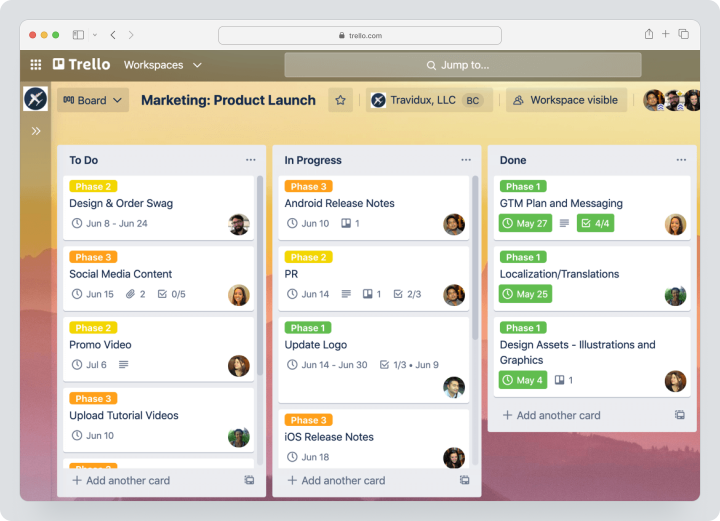
Jira
Jira — это мощный инструмент, специально разработанный для команд разработки ПО и IT. Он превосходит в отслеживании проблем и гибком управлении проектами, что делает его критически важным инструментом для управления рабочими процессами в технологических средах. Надежные функции отчетности Jira позволяют командам быстро отслеживать прогресс и выявлять узкие места. С начальной ценой от $7.16 за пользователя в месяц, Jira предлагает комплексное решение для команд, которым необходимо эффективно управлять сложными рабочими процессами и проектами разработки программного обеспечения.
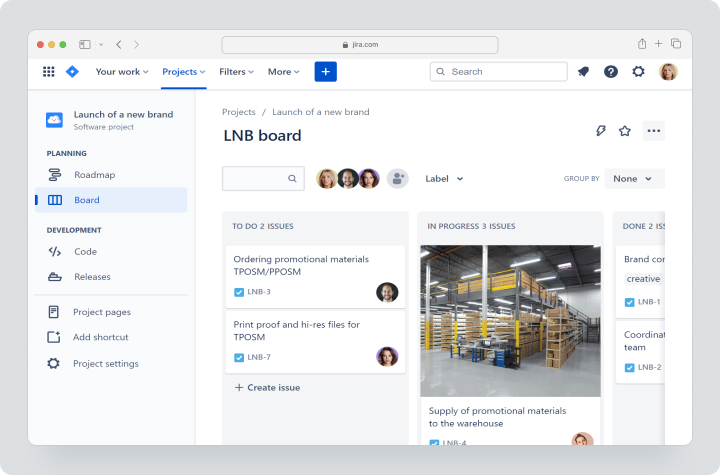
Monday.com
Monday.com предлагает гибкую платформу для управления рабочими процессами с настраиваемыми рабочими процессами, отслеживанием времени и обширными интеграциями с другими инструментами. Его визуальные инструменты отслеживания проектов позволяют командам создавать детализированные графики, назначать задачи и эффективно отслеживать прогресс. Monday.com особенно хорошо подходит для стартапов и растущих компаний, ищущих масштабируемое решение. Цена начинается от $9 за пользователя в месяц, что делает его доступным вариантом для малых и средних команд.
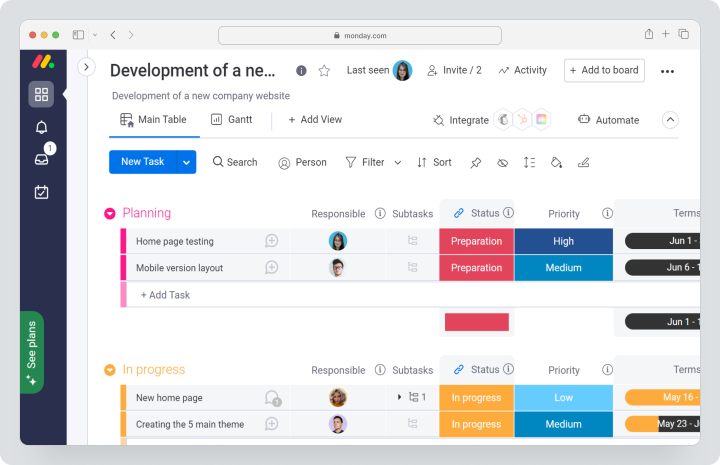
Airtable
Airtable — это универсальный инструмент управления рабочими процессами, который сочетает возможности базы данных с простотой таблицы. Он предлагает настраиваемые представления, мощные функции сотрудничества и широкий спектр интеграций, что делает его идеальным для команд, которым нужна гибкость в управлении своими рабочими процессами. Интерфейс Airtable весьма интуитивен, что позволяет пользователям создавать собственные рабочие процессы, которые соответствуют их конкретным потребностям. Инструмент также поддерживает совместную работу в реальном времени, что делает его простым для подключения участников команды. Цена начинается от $20 за место в месяц, что делает его доступным вариантом для компаний любого размера.
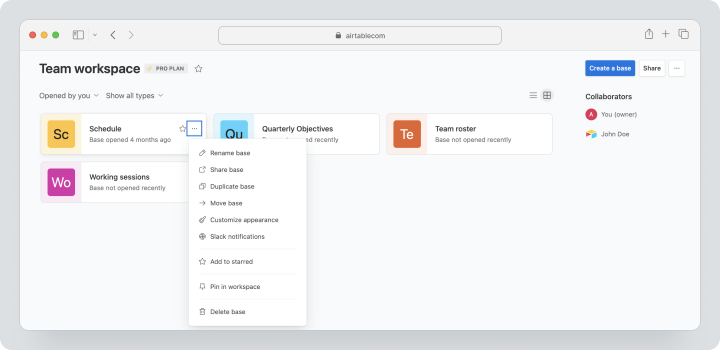
Notion
Notion — это универсальное рабочее пространство, которое совмещает функции заметок, управления задачами и базы данных в одной платформе. Он высоко адаптируем, позволяя командам управлять проектами, создавать базы знаний и бесшовно сотрудничать. Гибкость Notion делает его отличным выбором для компаний, стремящихся управлять рабочими процессами и информацией в одном месте. Интерфейс платформы легко навигируется, с настраиваемыми шаблонами, которые помогают упростить настройку. Цена начинается от $10 за пользователя в месяц, предоставляя отличную ценность для команд, нуждающихся в многофункциональном инструменте.
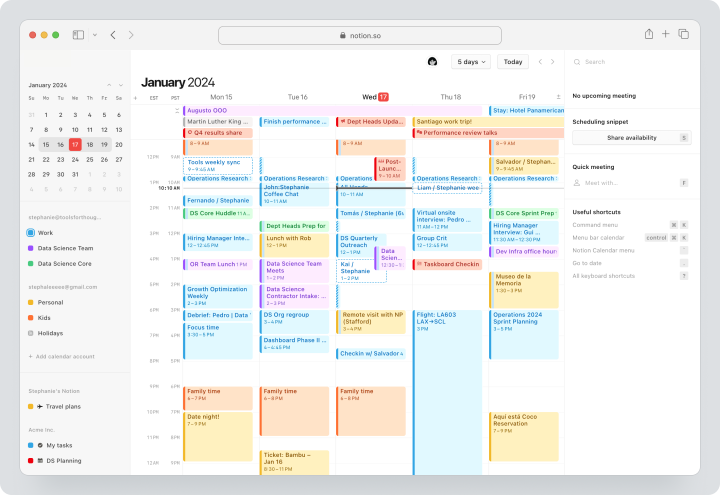
Pipefy
Pipefy — это мощный инструмент управления рабочими процессами, предназначенный для помощи компаниям в автоматизации их процессов и эффективном управлении задачами. Он предлагает функции, такие как автоматизация рабочих процессов, настраиваемые формы и управление задачами, что делает его подходящим для бизнесов, которым необходимо оптимизировать повторяющиеся процессы. Интуитивный интерфейс Pipefy позволяет пользователям быстро создавать и настраивать рабочие процессы, а его автоматизационные функции снижают необходимость в ручном вмешательстве. Цены доступны по запросу. Он позиционируется как премиум-решение для организаций, которым требуется надежная автоматизация рабочих процессов.
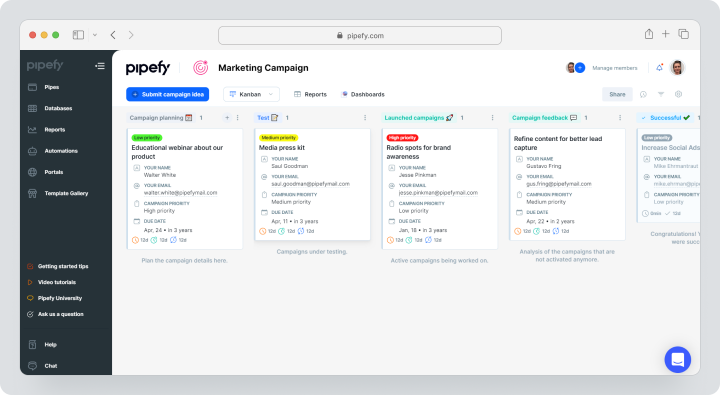
Smartsheet
Smartsheet сочетает знакомое ощущение таблицы с мощными функциями управления рабочими процессами. Он идеально подходит для команд, которые занимаются сложными проектами и требуют инструмент, поддерживающий детальное отслеживание и отчетность. Smartsheet предлагает такие функции, как диаграммы Ганта, управление ресурсами и совместная работа в реальном времени, что делает его универсальным инструментом для различных отраслей. Сетевой интерфейс платформы облегчает организацию данных и управление задачами, а функции автоматизации помогают оптимизировать рабочие процессы. Цена начинается от $9 за пользователя в месяц, что делает его доступным вариантом для команд с сложными потребностями в управлении рабочими процессами.
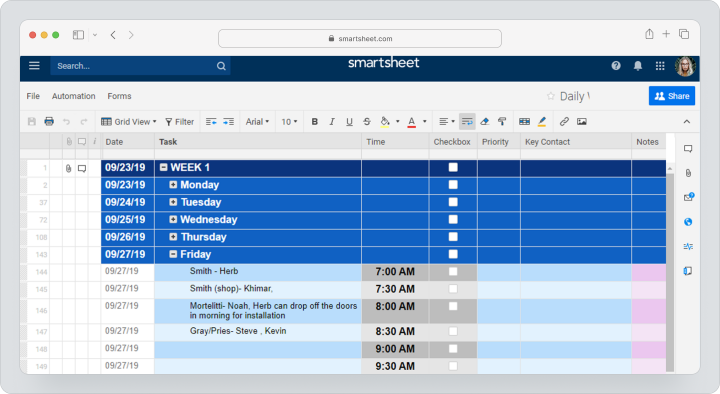
Кому стоит использовать программное обеспечение для управления рабочими процессами?
Программное обеспечение для управления рабочими процессами очень полезно в широком диапазоне отраслей:- IT-отделы: Упрощение разработки программного обеспечения, обеспечение согласованности команды и эффективное управление рабочими процессами проектов.
- Маркетинговые команды: Координация кампаний, управление созданием контента и отслеживание показателей производительности для оптимизации маркетинговых усилий.
- Операционные команды: В производстве или логистике оптимизация производственных процессов, уменьшение узких мест и повышение общей эффективности.
- Юридические фирмы: Управление процессами дел, отслеживание сроков и обеспечение соблюдения нормативных требований.
- Учебные заведения: Координация административных задач, управление записями студентов и облегчение коммуникации между департаментами.
- Финансовые отделы: Контроль за финансовыми операциями, соблюдение графиков утверждений и поддержание точных бухгалтерских записей.
- Поставщики медицинских услуг: Упрощение управления пациентами, поддержание точных записей и обеспечение соблюдения медицинских норм.
Практическое применение программного обеспечения для управления рабочими процессами
Программное обеспечение для управления рабочими процессами широко используется в различных отраслях для улучшения операционной эффективности и результативности. В юридической отрасли, например, эти инструменты незаменимы для управления сложными процессами ведения дел, отслеживания критических сроков и обеспечения соблюдения строгих нормативных требований. Юридические специалисты полагаются на программное обеспечение для управления рабочими процессами для организации документации, упрощения коммуникации с клиентами и поддержания точных записей, что вносит вклад в более эффективное ведение дел и лучшие результаты для клиентов.
В образовании, программное обеспечение для управления рабочими процессами играет критическую роль в координации административных процессов, управлении записями студентов и облегчении бесшовной коммуникации между департаментами. Школы и университеты используют эти инструменты для автоматизации рутинных задач, таких как управление регистрацией и отчетность по оценкам, позволяя сотрудникам сосредоточиться на более стратегических образовательных целях. Программное обеспечение также улучшает сотрудничество между преподавателями, сотрудниками и студентами, повышая общую эффективность учреждения.
В финансовом секторе, программное обеспечение для управления рабочими процессами необходимо для контроля финансовых операций, обеспечения своевременных утверждений и поддержания точных бухгалтерских записей. Банки и финансовые учреждения используют эти инструменты для автоматизации обработки транзакций, управления рабочими процессами по соблюдению норм и мониторинга финансовой деятельности в реальном времени. Это не только улучшает операционную эффективность, но и снижает риск ошибок и улучшает принятие решений.
Часто задаваемые вопросы
Что отличает программное обеспечение для управления рабочими процессами от программного обеспечения для управления проектами?
Программное обеспечение для управления рабочими процессами фокусируется на оптимизации и автоматизации текущих бизнес-процессов, в то время как программное обеспечение для управления проектами больше направлено на планирование, выполнение и отслеживание конкретных проектов.
Как программное обеспечение для управления рабочими процессами может улучшить сотрудничество команды?
Программное обеспечение для управления рабочими процессами улучшает командное сотрудничество, предоставляя общие рабочие пространства, облегчая коммуникацию в реальном времени и поддерживая организованную запись всех действий, обеспечивая согласованность всех с целями проекта.